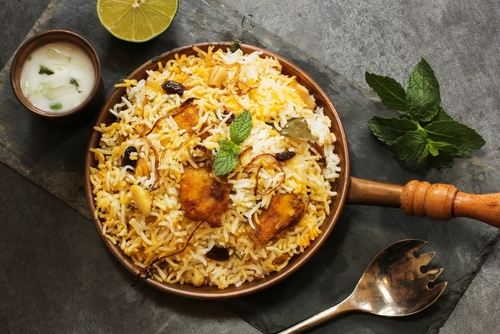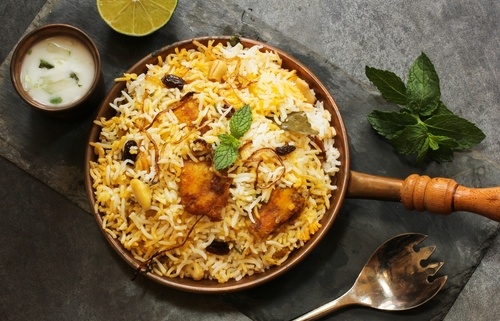Biryani: To Eat or Not to Eat
 By Noor H. Salem, contributing columnist
By Noor H. Salem, contributing columnist
Biryani has become a favorite food item of many, whether it’s pepper-less or extremely spicy, it has hit the menu of many restaurants. While it can be a healthy dinner meal, it can also be full of unhealthy fats, genetically engineered ingredients, and ingredients not very promoting to your health. Depending on where you eat it, how you cook it, and what you use, biryani can definitely become full of vitamins and nutrients, without lacking the unique taste.
Many restaurants use soybean oil or vegetable oil to cook food; especially food like biryani which would normally require a good amount of butter or ghee. Using butter, surprisingly to many, is much better for your health than corn or vegetable oils. These oils are highly processed and refined, and are high in trans-fat. They come from genetically engineered plants and seeds, and are extremely devastating to your health. Try getting these oils out of your kitchen, and feel comfortable asking restaurants what other options they can use to prepare your meal. Butter, organic preferred, is in its natural state, and actually comes with wonderful health benefits. Butter is one of the sunnah superfoods I discussed precisely in my book, Sunnah Superfoods. I share reasons of why many holistic doctors and health practitioners advise to “put butter back on your plate,” and how this food item can make room in your kitchen.
If you’d like to give your biryani the same traditional taste, definitely use the butter over the coconut oil in this recipe. Besides extra virgin olive oil, coconut oil is one of the best oils you could use to uphold better health. It has a myriad of health benefits, ranging from easier digestion to improved heart health. The ginger in this recipe gives a kick of taste, and also brilliant benefits. It allows you to digest better, which many could definitely use with a meal as heavy as this. Ginger carries unique anti-inflammatory benefits, and is much higher in the fresh ginger over the dried. Ginger aids in curing coughs, nausea, joint aches, cramps, high cholesterol, colds, and even constipation. Turmeric also carries anti-inflammatory benefits, and has aided friends I know personally who suffered from chronic joint pain. If you have arthritis, I’d recommend you begin adding ginger and turmeric to your daily diet. It may not be instant, but give it just a few weeks and you’ll see the amazing relief it brings you. This recipe is very high in protein, omega-3 fatty acids (if you purchase grass-fed meat/chicken), fiber, anti-inflammatory benefits, digestive health benefits, cognitive health benefits, and even cardiovascular health benefits. It’s very filling, and will provide you with good energy, unlike the restaurant version full of unhealthy fats- resulting in sluggishness soon after your meal.
Making homemade food assures you your meal is prepared with better ingredients; the majority of restaurants will most likely use ingredients you don’t find in your kitchen cabinet. Preparing your meals at home is the best way to ensure quality ingredients are placed on your dinner plate. Try this delicious biryani recipe at home, and you’ll realize meals are truly best out of your own kitchen. It’s wonderful alone or with yogurt and a fresh salad.
Ingredients:
9 cups water, total
(Himalayan Pink Salt, 2 bay leaves, 2 cinnamon sticks, 1 fresh ginger slice, teaspoon turmeric, ground mustard seed, rosemary, and 3-4 cardamom pods for the meat)
5 pounds baby lamb chunks, cut with bone (you can use chicken)
3 cups organic brown basmati rice
2 tablespoons turmeric, ground
2 tablespoons Himalayan Pink Salt
4 cloves garlic
¼ cup organic coconut oil (or organic butter)
½ raw onion, chopped
2 fresh jalapeno peppers, chopped
1-3 teaspoons ground red pepper (depending on your spicy preference)
8 slices fresh ginger
1 tablespoon ginger, ground
5 cinnamon sticks
10 green cardamom pods
12 cloves, whole
6 whole black peppercorns
1 whole allspice
4 bay leaves
½ cup fresh parsley/cilantro (for garnish)
Directions:
- Soak rice overnight if possible, otherwise several hours will do the job well.
- Place the lamb or chicken in your pressure cooker with the meat spices and about six cups of water. Allow to cook on high heat for about 30 minutes. Strain the meat, reserve the broth.
- In a medium pot, heat the coconut oil (or butter), ginger, onions, and jalapeno. Stir occasionally, cook for about 5-6 minutes.
- Transfer the broth to the pot. Add additional 3 cups boiling water.
- Add the rice, ¾ of the cooked meat, and remaining spices. Cover. Cook on high heat for about 10-12 minutes, or until the rice begins to show. Lower the heat, keep covered for 5 minutes.
- Transfer to a serving platter. Fluff with a fork. Top with remaining meat and fresh parsley/cilantro.
- Serves well with yogurt and salad.
Noor H. Salem is an author, speaker, and Certified Integrative Nutrition Health Coach, from Michigan. Noor works with clients in better understanding their bodies and healing with natural foods through her wellness practice, Holistic Noortrition. She presents various workshops, school lectures, group coaching classes, and community lectures on the topic of holistic health. Noor recently published her book, SUNNAH SUPERFOODS, a culmination of life-changing recipes and remedies, with a foreword by Dr. Waleed Basyouni. Her book consists of prophetic hadith, modern research, and delicious recipes, and is in the process of being translated into other languages.


















2016
2,185 views
views
0
comments